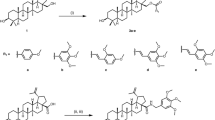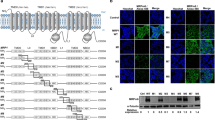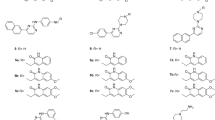Abstract
Inhibition of protein kinase C (PKC) is discussed as a new approach for overcoming multidrug resistance (MDR) in cancer chemotherapy. For evaluation of this concept we applied the bisindolylmaleimide GF 109203X, which shows a highly selective inhibition of PKC isozymes alpha, beta 1, beta 2, gamma, delta and epsilon in vitro. The efficacy of this compound in modulation of MDR was examined using several P-glycoprotein (P-gp)-overexpressing cell lines including a MDR1-transfected HeLa clone, and was compared with the activities of dexniguldipine-HCI (DNIG) and dexverapamil-HC1 (DVER), both of which essentially act via binding to P-gp. As PKC alpha has been suggested to play a major role in P-gp-mediated MDR, cell lines exhibiting different expression levels of this PKC isozyme were chosen. On crude PKC preparations or in a cellular assay using a cfos(-711)CAT-transfected NIH 3T3 clone, the inhibitory qualities of the bisindolylmaleimide at submicromolar concentrations were demonstrated. At up 1 microM final concentrations of the PKC inhibitor GF 109203X, a concentration at which many PKC isozymes should be blocked substantially, no cytotoxic or MDR-reversing effects whatsoever were seen, as monitored by 72 h tetrazolium-based colorimetric MTT assays or a 90 min rhodamine 123 accumulation assay. Moreover, depletion of PKC alpha by phorbol ester in HeLa-MDR1 transfectants had no influence on rhodamine 123 accumulation after 24 or 48 h. MDR reversal activity of GF 109203X was seen at higher final drug concentrations, however. Remarkably, [3H]vinblastine-sulphate binding competition experiments using P-gp-containing crude membrane preparations demonstrated similar dose dependencies as found for MDR reversion by the three modulators, i.e. decreasing efficacy in the series dexniguldipine-HCl > dexverapamil-HCl > GF 109203X. Similar interaction with the P-gp in the micromolar concentration range was revealed by competition of GF 109203X with photoincorporation of [3H]azidopine into P-gp-containing crude membrane preparations. No significant effect of the PKC inhibitor on MDR1 expression was seen, which was examined by cDNA-PCR. Thus, the bisindolylmaleimide GF 109203X probably influences MDR mostly via direct binding to P-gp. Our work identifies the bisindolylmaleimide GF 109203X as a new type of drug interacting with P-gp directly, but does not support the concept of a major contribution of PKC to a P-gp-associated MDR, at least using the particular cellular model systems and the selective, albeit general, PKC inhibitor GF 109203X.
This is a preview of subscription content, access via your institution
Access options
Subscribe to this journal
Receive 24 print issues and online access
$259.00 per year
only $10.79 per issue
Buy this article
- Purchase on Springer Link
- Instant access to full article PDF
Prices may be subject to local taxes which are calculated during checkout
Similar content being viewed by others
Author information
Authors and Affiliations
Rights and permissions
About this article
Cite this article
Gekeler, V., Boer, R., Uberall, F. et al. Effects of the selective bisindolylmaleimide protein kinase C inhibitor GF 109203X on P-glycoprotein-mediated multidrug resistance. Br J Cancer 74, 897–905 (1996). https://doi.org/10.1038/bjc.1996.454
Issue Date:
DOI: https://doi.org/10.1038/bjc.1996.454
This article is cited by
-
Inhibition of gap junctional Intercellular communication in WB-F344 rat liver epithelial cells by triphenyltin chloride through MAPK and PI3-kinase pathways
Journal of Occupational Medicine and Toxicology (2010)
-
Distinct requirements for activation-induced cell surface expression of preformed Fas/CD95 ligand and cytolytic granule markers in T cells
Cell Death & Differentiation (2009)
-
Antiepileptic drugs reduce efficacy of methotrexate chemotherapy by downregulation of Reduced folate carrier transport activity
Leukemia (2009)
-
Metabolites of benzene are potent inhibitors of gap-junction intercellular communication
Archives of Toxicology (2005)
-
Regulation of phorbol ester-mediated TRAF1 induction in human colon cancer cells through a PKC/RAF/ERK/NF-κB-dependent pathway
Oncogene (2004)



